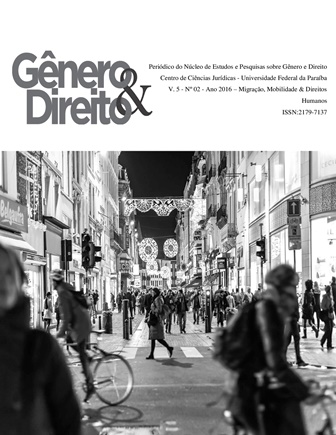DISREGARDING ARISTOTLE’S MOTTO “UBI SOCIETAS IBI IUS”: THE BIASED GENESIS OF HUMAN TRAFFICKING PROTOCOL AND THE CONSEQUENCES ON ITS ENFORCEMENT
Palavras-chave:
human traffic. human rigths. lawResumo
Aristotle’s motto “Ubi societas ibi ius” reminds us not only of the fact that where each society produces its own norms and regulations, but also that there must be a close inter-relation between the social reality of a phenomenon and its normative framework in order for a law to be effectively enforced. The definition of human trafficking contained in the Palermo Protocol was strongly influenced by the complex negotiations featuring different approaches, attitudes and political agendas. This essay will analyze the core contents of the Protocol, from the title to the definition of trafficking, as well as the constitutive elements of the crime, exploring how the legacy deriving from a biased discourse on the trafficking phenomenon did not allow to harvest the full potential of international law as a guiding tool and a common platform for States’ action. As a consequence, the Protocol’s definition is significantly ambiguous and de facto results in its often difficult and uneven transposition at national level.Downloads
Referências
Albano, Teresa and Volpicelli, Stefano, “Il mancato sviluppo: le conseguenze del fallimento dei progetti migratori sugli individui e sulle società”, in Saquella, Serena and Volpicelli, Stefano (2010), Migrazione e sviluppo, una nuova relazione, la nuova cultura edizioni, Roma.
Atkinson, Anthony B. (1997), “Bringing Income Distribution in from the Cold.” Economic Journal, 107(441): 297–321.
Atkinson, Anthony B. and Morelli, Salvatore (2014), “Chartbook of Economic inequality”, ECINEQ Society for the Study of Economic Inequality, Working Papers 2014-324.
Baumann Zigmunt (1998), “Globalization: The Human Consequences”, Cambridge, Polity Press; Oxford-Blackwell.
Baumann Zigmunt (2004), “Wasted Lives. Modernity and its Outcasts”, Cambridge, Polity Press.
Berger, Peter L. and Luckmann Thomas (1966), The Social Construction of Reality: A Treatise in the Sociology of Knowledge, Garden City, NY: Anchor Books.
Boyle, Alan and Chinkin, Christine (2007), “The Making of International Law”, New York Oxford University Press.
Congdon Fors, Heather (2012), “Social Globalization and Child Labor.” Working Paper No. 533, School of Business, Economics and Law, University of Gothernburg, Gothenburg, Sweden
DellaVigna, Stefano and Ethan, Kaplan (2007), “The Fox News Effect: Media Bias and Voting.” Quarterly Journal of Economics, 122(3): 1187–1234
Ditmore, Melissa and Wijers, Marjan (2003), The negotiations on the UN Protocol on Trafficking in Persons, NEMESIS, no. 4.
Doezema, Jo (2002), Who gets to choose? Coercion, consent and the UN Trafficking Protocol, Gender and Development, Vol. 10.
Freud, Sigmund (1930), “Das Unbehagen in der Kultur”, First publisher Internationaler Psychoanalytischer Verlag, Vienna.
Fromm, Eric (1976), To Have or To Be, Continuum, London-New York.
Fukuyama, Francis (1992), “The End of History and the Last Man”, Free Press.
Gallagher, Anne (2009), Human Rights and Human Trafficking: Quagmire or Firm Ground? A Response to James Hathaway, Virginia Journal of International Law, vol.49, No. 4.
Gentzkow, Matthew and Jesse, Shapiro (2004), “Media, Education and Anti-Americanism in the Muslim World.” Journal of Economic Perspectives, 18(3): 117–133.
ILO (2008), World of Work Report, Income Inequalities in the Age of Financial Globalization, International Institute for Labour Studies, Geneva.
IOM (2012) Migration Policy in Brief, Geneva.
Kihato, Caroline (2013), Migrant Women of Johannesburg, Everyday Life in an in-between City, MacMillan, New York.
Lazcko, Franck (2002), Human trafficking: The Need for Better Data, The Online Journal of the Migration Policy Institute.
Moyo, Dambaso (2009), Dead Aid, Farrar, Straus and Giroux, New York.
Nelken, David (2014), Thinking about legal culture, King’s College London Dickson Poon School of Law Legal Studies Research Paper Series: Paper No. 2014-33
Pope Francis (2015), encyclical on the environment and human ecology, Libreria Editrice Vaticana.
Reisman W.Michael (1981), “International Law Making: A Process of Communications”, Yale Law School.
Romano, Santi (1909), Lo Stato moderno e la sua crisi, in Scritti minori, vol. I, Diritto costituzionale, Milano, II ed. 1990.
Romano, Santi, (1918), L’ordinamento giuridico, ed. Sansoni, Firenze 1946
Sandholtz, Wayne and Mark, M. Gray (2003). “International Integration and National Corruption.” International Organization, 57(4): 761–800
Saquella, Serena and Volpicelli, Stefano (2012), Migrazione e sviluppo, una nuova relazione, la nuova cultura edizioni, Roma.
Sassen, Saskia (1998), Globalization and its discontents. Essays on the New Mobility of People and Money, New York: New Press.
Stiglitz, Joseph (2002), Globalization and its discontents, Penguin Books, London.
UNODC (2014), Global Report on Trafficking in Persons, New York.
Yun, Gao (2004), Concealed Chains: Labour exploitation and Chinese migrants in Europe, ILO Working Paper.

